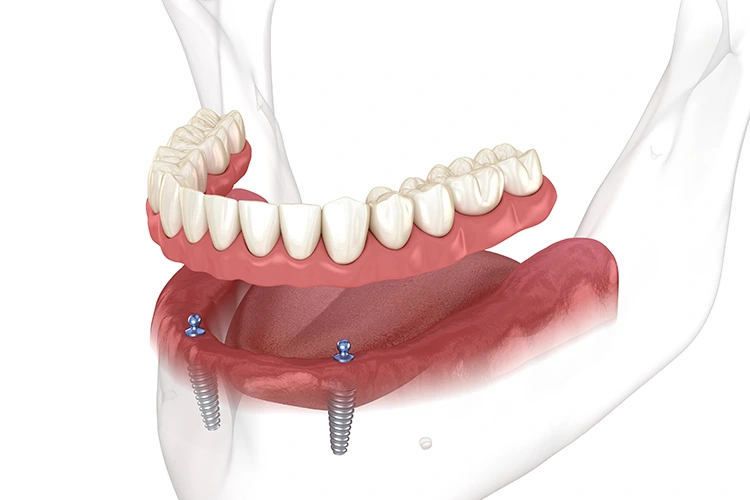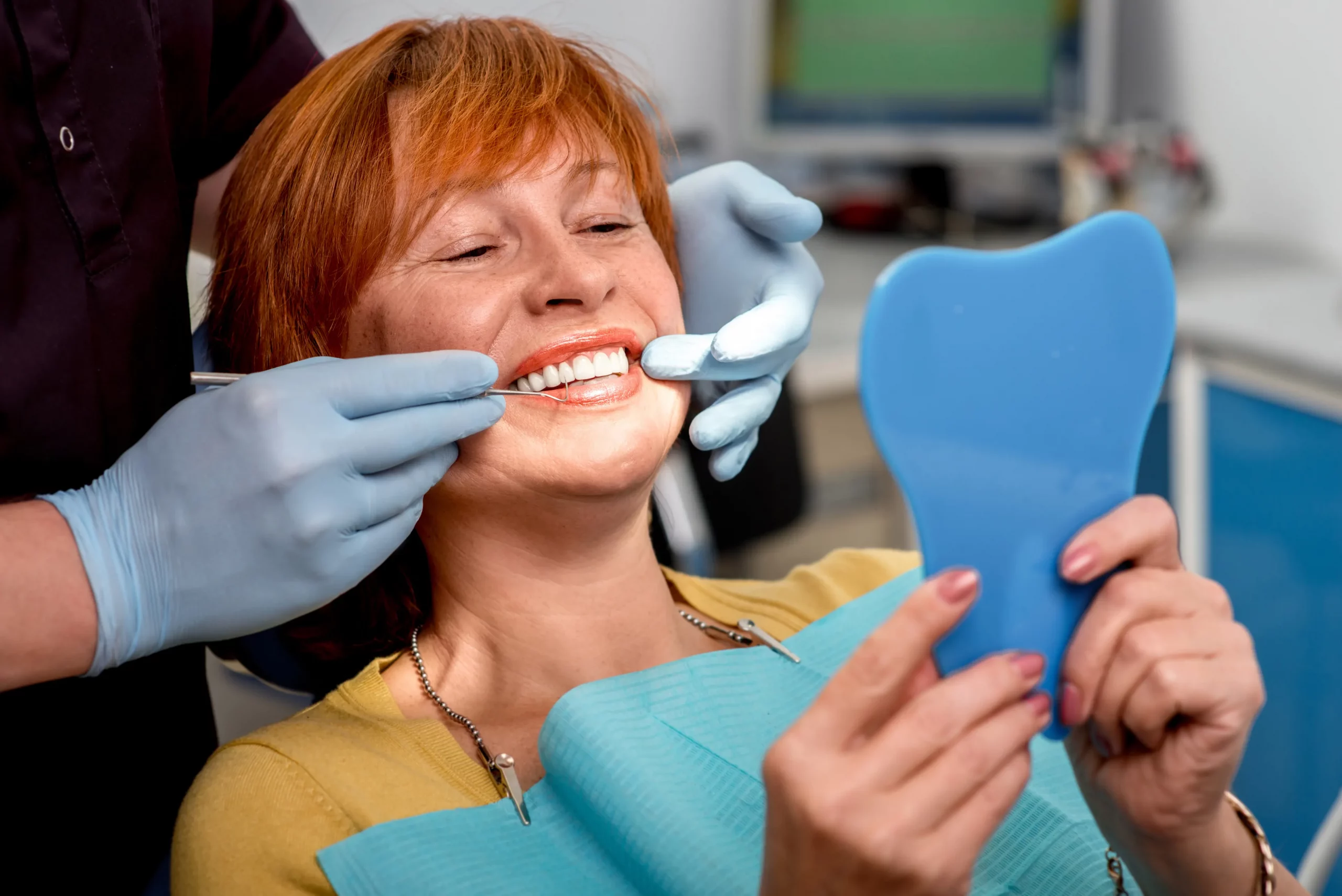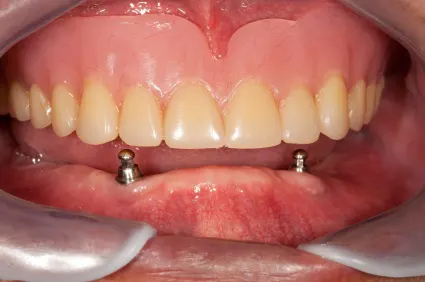These reasons and others are why many of our patients at Sunflower Dental Spa are turning to denture stabilization. Even if you've had dentures for a while, you can still take advantage of this process.
In this article, we'll explain what you need to know about denture stabilization and how it can help you get your smile and your confidence back.
Conventional dentures sit on top of your gums. At first, they fit well and are fairly stable, but over time your jawbone will deteriorate. This allows the dentures to slip and slide around in your mouth, causing pressure and friction sores. While you can use denture adhesive to hold them in place, it can wear off, have an unpleasant taste, and is often difficult to clean off dentures.
This is why so many of our patients at Sunflower Dental Spa are interested in denture stabilization. This procedure involves the placement of 2 to 4 dental implants to secure the denture plate in place. We offer two options for denture stabilization:
Stabilized dentures can be fixed or removable. If they are fixed, they require no additional care considerations beyond standard oral hygiene. If they are removable, they should be cared for like conventional dentures.

Implant-supported dentures |
Traditional dentures |
| Replaces up to an entire arch of missing teeth | Replaces up to an entire arch of missing teeth |
| Dental implants support jawbone and gum health | Does not support jawbone health |
| Secured in place | Not secure, can cause pressure and friction sores on gums |
| Requires surgery for implant placement | Does not require surgery |
| Fixed implant dentures are easy to care for, but removable implant dentures can be challenging | Can be challenging to care for |
| Can be expensive, but last longer than traditional dentures | Cost-effective, but require replacement or adjustment every few years |
Replaces up to an entire arch of missing teeth
Dental implants support jawbone and gum health
Secured in place
Requires surgery for implant placement
Fixed implant dentures are easy to care for, but removable implant dentures can be challenging
Can be expensive, but last longer than traditional dentures
Replaces up to an entire arch of missing teeth
Does not support jawbone health
Not secure, can cause pressure and friction sores on gums
Does not require surgery
Can be challenging to care for
Cost-effective, but require replacement or adjustment every few years
Conventional dentures tend to wear out quickly or don't fit anymore due to jawbone deterioration. Either way, you have to replace them or at least have them relined every 5 to 10 years. This can be expensive in the long run.
Stabilized dentures can last up to 20 years or more with proper care and maintenance, which means you don't have to worry about the cost of replacing them as often.
Conventional dentures rest directly on your gums and move around in your mouth. This can cause pressure and friction sores on the gums, which can be painful.
Denture stabilization secures the denture plate in place with dental implants. This means that it does not sit on top of the gum but is secured with the jawbone. Also, it cannot move around or fall out when you're trying to eat, talk, or laugh.
Conventional dentures will replace some of the aesthetics and functionality of your smile but the slipping and sliding- and possibly falling out can have a major impact on your confidence.
Denture stabilization uses dental implants to secure the denture plate in place, which means you can be confident that they won't cause problems no matter what situation you find yourself in.
Conventional dentures can cause pressure and friction sores to develop on your gums, which can become infected. This will not only impact your oral health but your overall health as well. Plus, your jawbone will begin to deteriorate without the stimulation from your teeth, which increases your risk of problems such as gum disease, additional tooth loss, and more.
The dental implants that are used to secure the denture in place prevent pressure and friction sores, as well as protect the health of your jawbone.
While your ability to eat is restored with dentures, you still have some restrictions. If you bite down on something that is too hard, it could cause your dentures to break, which means you must have them repaired or replaced, increasing your cost.
Dental implants increase the amount of bite force that your dentures can tolerate, which means you don't have to be concerned with food restrictions. If you have fixed implant dentures, your risk of damage is much lower because you don't have to worry about damaging them when you are removing or placing them in your mouth.
The first step in any procedure at Sunflower Dental Spa, including denture stabilization, is the consultation visit. During this visit, the dentist will examine your mouth which will include any necessary imaging. In addition, your oral and overall health history will be reviewed as well as your expectations for treatment. This information will be used to create your personalized treatment plan.
Once we determine if denture stabilization is appropriate for you, the implant placement process will begin. This will require a minimum of 2 implants to be placed, depending on your needs. The healing process begins after the implants are placed, and usually lasts for about 2 to 6 months, depending on how your body responds.
After you have healed, a second surgery may be required to place the attachments, or abutments, on the implants. This can be skipped if the attachments are already present.
At this time, the dentist will take an impression of your mouth to send to the dental lab where your custom overdenture will be fabricated. When the overdenture is sent back to the clinic, you will come in for placement. We will ensure that it fits properly and secure it in place based on the system that you have.
Before you leave, we will offer instructions on how to properly maintain your new artificial teeth.

The average cost of denture implants is approximately $6,000 for two implants and an overdenture. This will increase if you need additional implants or if you choose a more expensive material for your dentures. Many times, dental insurance will cover a portion of this process. However, our office staff will be happy to work with your provider to be sure. If you do not have insurance or if you need help paying for your implant dentures, we will be happy to explain our financing options.
The average cost of single dental implants is approximately $5,000 per tooth. Therefore, if you are in need of full mouth reconstruction, you can pay $60,000 or more to replace each tooth with a single implant.
However, if you choose implant-supported dentures, you can combine the affordability of dentures with the stability of dental implants.
Denture stabilization is the ideal solution for patients who have had dentures for awhile but want something more stable. In addition, if you are just starting out with dentures, you may want to skip straight to something more stable.
Dental implants are the ideal solution for tooth replacement but can get expensive if you replace each tooth with a single implant. If you are interested in learning more about denture stabilization, schedule your consultation with the team at Sunflower Dental Spa.
We are located at 4095 US Highway 1 in Rockledge. Our office hours are Monday through Friday from 8:00 AM to 5:00 PM. You can schedule your appointment by calling the office at (321) 358-1730 or by visiting our website.
We offer a variety of dental services in a relaxing, spa-like atmosphere. We strive to make every visit a pleasant one with heated massage chairs, pillows and blankets, eye masks, and more.
